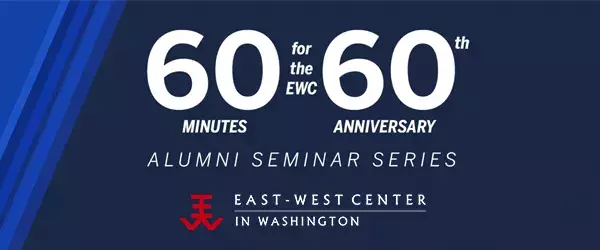Error message

OFFICE/DEPARTMENT
The East-West Center in Washington invites you to the
60 Minutes for the 60th Anniversary Alumni Seminar Series:
The National Security and Regional Implications of
Japan’s Rapidly Aging Society
Featuring:
Dr. Andrew L. Oros
(EWCW Northeast Asia Visiting Fellow ’05 / Adjunct Fellow ’14),
Professor of Political Science and International Studies,
Washington College, Chestertown, Maryland
Dr. Satu P. Limaye (Moderator)
Vice President, East-West Center &
Director, East-West Center in Washington
East-West Center in Washington · The National Security and Regional Implications of Japan’s Rapidly Aging Society
All of the major states of Northeast Asia, as well as most US allies elsewhere in the Indo-Pacific, face shrinking and aging populations that require changes to

their existing national security practices. Japan – the most important military ally and economic partner of the United States in the Indo-Pacific – has shrunk by over a million people since 2010 and is the world’s first “super-aged society.” Yet, demography is not destiny. Japan’s military has become the most powerful and capable it has ever been in the past decade, despite demographic challenges. My initial research suggests that the implications of demographic change that are posited in the existing literature are not as straightforward as they appear. Demographic change is an important factor, but so are differences in security threats, the availability of technological solutions, and whether the political and social system is willing and able to adapt. This seminar discussed Japan’s current approach to dealing with the national security implications of its demographic change and implications for Japan’s future as well as future regional security dynamics.
To view the Power Point for this webinar, click here.
This year marks the 60th anniversary of the East-West Center and its mission to promote better relations and understanding among the people and nations of the United States, Asia, and the Pacific through cooperative study, research, and dialogue. The East-West Center in Washington (EWCW)’s 60 Minutes for the EWC 60th Anniversary Alumni Seminar Series highlights the work of EWCW alumni/ae who have participated in our fellowship, publication, dialogue, and conference programs.
SPEAKER BIOGRAPHIES
Andrew L. Oros is Professor of Political Science and International Studies at Washington College in Chestertown, Maryland. Beginning in September 2020 he will be a fellow at the Wilson Center in Washington, DC to pursue his sabbatical leave project on “America’s Aging Allies in Asia: National Security and Demographic Change in the Indo-Pacific.” He conducted research for his last book, Japan’s Security Renaissance (Columbia University Press, 2017), as an invited research fellow at Japan’s National Institute of Defense Studies and as a Japan Foundation Abe fellow based at Keio University in Tokyo and Peking University in Beijing, and workshopped the manuscript as an adjunct fellow at the East-West Center in Washington. He also is the author of two other books and numerous articles and book chapters on issues related to East Asian security and Japanese politics. He is a graduate of the University of Southern California and earned his doctorate in political science from Columbia University.
Satu Limaye is Vice President of the East-West Center and the Director of the East-West Center in Washington where he created and now directs the Asia Matters for America initiative and is the founding editor of the Asia Pacific Bulletin. He is also a Senior Advisor at CNA Corp (Center for Naval Analyses) and Senior Fellow on Asia History and Policy at the Foreign Policy Institute at Paul H. Nitze School of International Studies (SAIS). He is magna cum laude and Phi Beta Kappa graduate of Georgetown University and received his doctorate from Oxford University (Magdalen College) where he was a George C. Marshall Scholar. Recent publications include: “America’s ‘Pacific Principle’ in an Indivisible Pacific Islands Region,” (Asia-Pacific Bulletin); “Despite Stumbles, America’s Engagement with Southeast Runs Deep,” (Global Asia); Raging Waters: China, India, Bangladesh, and Brahmaputra Water Politics (Marine Corps University Press); and Russia’s Peripheral Relevance to US-Indo Pacific Relations (Center for the National Interest).
The East-West Center in Washington invites you to the
60 Minutes for the 60th Anniversary Alumni Seminar Series:
The National Security and Regional Implications of
Japan’s Rapidly Aging Society
Featuring:
Dr. Andrew L. Oros
(EWCW Northeast Asia Visiting Fellow ’05 / Adjunct Fellow ’14),
Professor of Political Science and International Studies,
Washington College, Chestertown, Maryland
Dr. Satu P. Limaye (Moderator)
Vice President, East-West Center &
Director, East-West Center in Washington
East-West Center in Washington · The National Security and Regional Implications of Japan’s Rapidly Aging Society
All of the major states of Northeast Asia, as well as most US allies elsewhere in the Indo-Pacific, face shrinking and aging populations that require changes to

their existing national security practices. Japan – the most important military ally and economic partner of the United States in the Indo-Pacific – has shrunk by over a million people since 2010 and is the world’s first “super-aged society.” Yet, demography is not destiny. Japan’s military has become the most powerful and capable it has ever been in the past decade, despite demographic challenges. My initial research suggests that the implications of demographic change that are posited in the existing literature are not as straightforward as they appear. Demographic change is an important factor, but so are differences in security threats, the availability of technological solutions, and whether the political and social system is willing and able to adapt. This seminar discussed Japan’s current approach to dealing with the national security implications of its demographic change and implications for Japan’s future as well as future regional security dynamics.
To view the Power Point for this webinar, click here.
This year marks the 60th anniversary of the East-West Center and its mission to promote better relations and understanding among the people and nations of the United States, Asia, and the Pacific through cooperative study, research, and dialogue. The East-West Center in Washington (EWCW)’s 60 Minutes for the EWC 60th Anniversary Alumni Seminar Series highlights the work of EWCW alumni/ae who have participated in our fellowship, publication, dialogue, and conference programs.
SPEAKER BIOGRAPHIES
Andrew L. Oros is Professor of Political Science and International Studies at Washington College in Chestertown, Maryland. Beginning in September 2020 he will be a fellow at the Wilson Center in Washington, DC to pursue his sabbatical leave project on “America’s Aging Allies in Asia: National Security and Demographic Change in the Indo-Pacific.” He conducted research for his last book, Japan’s Security Renaissance (Columbia University Press, 2017), as an invited research fellow at Japan’s National Institute of Defense Studies and as a Japan Foundation Abe fellow based at Keio University in Tokyo and Peking University in Beijing, and workshopped the manuscript as an adjunct fellow at the East-West Center in Washington. He also is the author of two other books and numerous articles and book chapters on issues related to East Asian security and Japanese politics. He is a graduate of the University of Southern California and earned his doctorate in political science from Columbia University.
Satu Limaye is Vice President of the East-West Center and the Director of the East-West Center in Washington where he created and now directs the Asia Matters for America initiative and is the founding editor of the Asia Pacific Bulletin. He is also a Senior Advisor at CNA Corp (Center for Naval Analyses) and Senior Fellow on Asia History and Policy at the Foreign Policy Institute at Paul H. Nitze School of International Studies (SAIS). He is magna cum laude and Phi Beta Kappa graduate of Georgetown University and received his doctorate from Oxford University (Magdalen College) where he was a George C. Marshall Scholar. Recent publications include: “America’s ‘Pacific Principle’ in an Indivisible Pacific Islands Region,” (Asia-Pacific Bulletin); “Despite Stumbles, America’s Engagement with Southeast Runs Deep,” (Global Asia); Raging Waters: China, India, Bangladesh, and Brahmaputra Water Politics (Marine Corps University Press); and Russia’s Peripheral Relevance to US-Indo Pacific Relations (Center for the National Interest).








